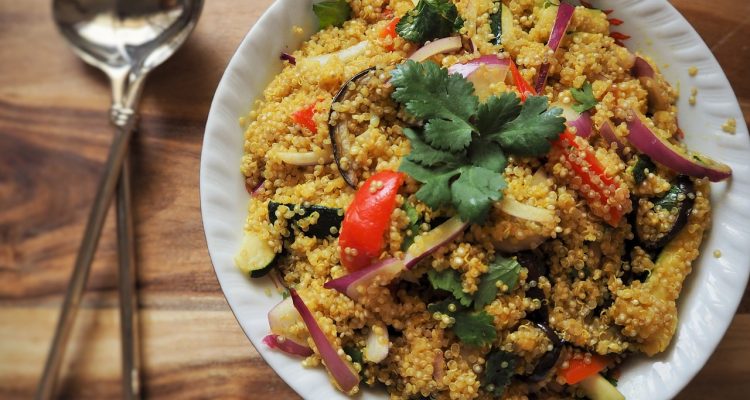As an eco-conscious person you surely save water and try to be more energy efficient in your everyday life, but did you know that the food you consume has a huge impact in the environment too?
Taking in consideration the carbon footprint generated to produce and transport, the water dependency and risk to biodiversity, there are food that are better than others from the ecological standpoint. Swap some common foods with a greener option with the help of this guide.
Replace white rice with superfood grains
The most widely used staple food in the world is rice, but is also one of the most easily replaceable with a variety of grains. Quinoa, amaranth and millet are great options, and you can cook almost every rice meal with them, and all with improved nutritional value and taste!
What is the advantage: The amount of fresh water that goes into farming rice is huge -remember that most of the growing process is underwater-, and it also need a long processing to peel and buff. Most of the suggested grains thrive in all kind of soils -even with drought- and they need a more simple processing to market, leaving a smaller carbon footprint.

Replace meat once a week with vegetable proteins
If you are not ready to give up meat for good, consider following #MeatlessMonday at least. You won’t miss your usual burger with all the protein replacements available in the market that replicates the texture and flavour of the original meat.
If you are the cooking type, you can make your own versions with grains and vegetable proteins, or just take the chance to discover new vegan meals.
What is the advantage: Meat industry is highly contaminant. If your four-person family skips steak once a week, it’s like taking your car off the road for nearly three months, according to EWG.

Replace goji berries and açai for locally grown berries
You can feel very natural and healthy eating exotic fruits from the tropic but, pound-by-pound you can have the same nutritional values with an organic locally grown berries. Don’t get fooled by fashion and choose the seasonal fruit from your local farmer’s market, and remember that it’s all about variety so eat all types to get the nutrients your body needs.
What are the advantages: Exotic berries demand a huge environmental impact to grow, process and transport to market, that affects not only their country of origin but the whole planet. Also, favoring the local production you are supporting the sustainability of your region.

Replace coconut and palm oil for greener cooking oils
While some can argue that most oils are obtained from GMO goods, there are still other great options of organic cooking oils in every price range. Olives need more water to grow, but sunflower and safflower oil are good choices; and the three of them can be easily found in their organic versions!
What are the advantages: The coconut trees produce less as they age, so in the near future a lot more land will be needed to support oil production, and that’s the opposite of sustainability. And the very anti-ecological palm oil is responsible for the outrageous deforestation of Indonesian and Malaysian rainforests, which is driving orangutans to extinction and threatening many other species, and the whole region biodiversity.

Replace refined flours for whole-grains
Whole-grain flours are way more nutritious and have higher fiber values, that contribute to a better immune system. When cooking, replace the traditional refined wheat flour for its integral version for breads, crusts, pizzas and pasta. For elaborated goods, choose whole-grain bread over white bread, and try to reduce the purchase of bakery or snack products made from refined flour.
What are the advantages: Wheat requires extensive refining to obtain white flour, so it demands more energy and resources -like we’ve already told you about rice- and has a greater impact on the planet.

Replace industrialized farm products for ethical food
Environmentalism and sustainability is more than saving water and energy, so choosing products that ensure the ethical treatment of nature are best for the planet that the industrialized ones.
Choose the dairy, eggs, poultry, fish and meat that follow humane and ethical procedures, and avoid purchasing over elaborated food from dubious provenience.
What are the advantages: Ethical humane foods consider the sustainability of the species, fighting the abuse of animals, the exploitation of workers, and the environmental devastation. They also have less chemical additives and production enhancers that might affect health and soil. Small scale food production generates less waste and has a lower energy consumption, too.

You can make good food choices every day, without sacrificing flavour. Remember that most of the options we propose are healthier and have better nutritional values than their traditional counterparts, so upgrade today your diet and care for the planet at the same time!
Do you know any other food replacements for a greener diet? Leave it in the comments below!

